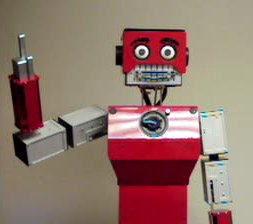
Syllabus
In addition, various seminal research articles will be made available and read throughout the course.
Course Goals:
There are three goals of this course: (1) to present an overview of
the state-of-the-art in behavior-based robotics research and its
implications for embodied cognitive science, incorporating results from
various different
subdisciplines in cognitive science (including artificial intelligence,
robotics, ethology and psychology); (2) to give students an
appreciation of how "hard" robotics is, because the real world
(different from many simulation environments) is full of imperfections,
noise, and failures that successful robot models have to cope with; and
(3) to foster the students' ability to work in (interdisciplinary)
groups on original complex software projects to tackle research
questions that can lead to publishable results.
| Topics: | Appr. number of lectures |
| Introduction to embodied cognitive science and behavior-based robotics |
|
| Overview of the ADE development environment and the available robots |
|
| Reactive behavior-based architectures |
|
| Perception |
|
| Deliberative systems |
|
| Hybrid systems |
|
Note that the number of lectures on each topic (as well as some of the various subtopics covered by the lectures) may vary depending on the respective research projects picked by students.
| 92 - 100 | A |
| 89 - 91 | A- |
| 86 - 88 | B+ |
| 82 - 85 | B |
| 79 - 81 | B- |
| 76 - 78 | C+ |
| 72 - 75 | C |
| 69 - 71 | C- |
| 62 - 68 | D |
| 0 - 61 | F |
Although no rigorous attendance policy will be implemented for this course, students are expected to attend all classes (students with excessive absences will be very unlikely to pass the course). Everybody is encouraged to participate actively and contribute to the course (e.g., by asking questions and sharing information in the online web-based forum).
This course follows the Faculty of Arts, Sciences and Engineering Guidelines Pertaining to Religious Observances. You are not required to prove attendance at religious services or events to obtain an accommodation for religous observance, but you are requested to provide indication of such any accommodation requests early in the semester.
Incompletes:
Per Tufts policy, incompletes will be granted under only the most exceptional of circumstances (out of your control) and only in cases where most of the course work has already been completed. Examples of exceptional circumstances include a death in the family or major illness that keeps you out of the classroom for a significant period of time. Getting behind in the class due to other obligations outside the classroom (other classes, job) doesn't warrant granting an incomplete (for details see the .
This course is conducted in accordance with the Academic Integrity
standards as described in the School
of
Arts
and
Sciences / School of Engineering Academic Integrity booklet.
Specifically,
it is considered cheating
if you obtain any kind of
information about answers and solutions to any of the assignments in
this course from any non-intended source (including your peers) or
conversely transfer such information to others. When in doubt, ask the
instructor. Nobody begins the semester with the intention of cheating.
Students
who cheat do so because they fall behind gradually, and then panic at
the last minute. Some students get into this situation because they are
afraid of an unpleasant conversation with an instructor if they admit
to not understanding something. I would much rather deal with your
misunderstanding early than deal with its consequences later.
Please, feel free to ask for help as soon as you need it. And
remember: plagiarism violates
academic honesty and Tufts faculty are required by Tufts policies
to report any form of plagiarism.
Statement for Students with Disabilities:
The Americans with Disabilities Act (ADA) is a federal
anti-discrimination statute that provides comprehensive civil rights
protection for persons with disabilities. Among other things, this
legislation requires that all students with disabilities be guaranteed
a learning environment that provides for reasonable accommodation of
their disabilities. If you believe you have a disability requiring an
accommodation, please contact Disability
Services.